Nathaniel Macon facts for kids
Quick facts for kids
Nathaniel Macon
|
|
|---|---|
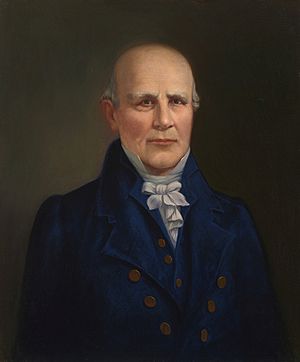 |
|
| President pro tempore of the United States Senate | |
| In office May 20, 1826 – December 2, 1827 |
|
| Preceded by | John Gaillard |
| Succeeded by | Samuel Smith |
| 5th Speaker of the United States House of Representatives | |
| In office December 7, 1801 – March 3, 1807 |
|
| Preceded by | Theodore Sedgwick |
| Succeeded by | Joseph B. Varnum |
| Dean of the United States House of Representatives | |
| In office March 4, 1807 – December 13, 1815 |
|
| Preceded by | George Thatcher |
| Succeeded by | Richard Stanford |
| United States Senator from North Carolina |
|
| In office December 5, 1815 – November 14, 1828 |
|
| Preceded by | Francis Locke Jr. |
| Succeeded by | James Iredell Jr. |
| Member of the U.S. House of Representatives from North Carolina |
|
| In office March 4, 1791 – December 13, 1815 |
|
| Preceded by | Hugh Williamson |
| Succeeded by | Weldon N. Edwards |
| Constituency | 2nd district (1791–1793) 5th district (1793–1803) 6th district (1803–1815) |
| Personal details | |
| Born | December 17, 1757 Warrenton, Province of North Carolina, British America |
| Died | June 29, 1837 (aged 79) Warrenton, North Carolina, U.S. |
| Political party | Anti-Administration (before 1792) Democratic-Republican (1792–1828) |
| Education | Princeton University |
| Signature | |
Nathaniel Macon (December 17, 1757 – June 29, 1837) was an important American politician from North Carolina. He served in both the United States House of Representatives and the United States Senate.
Macon was the fifth Speaker of the House, leading the House from 1801 to 1807. He was a member of the House from 1791 to 1815, and then a Senator from 1815 to 1828. He also served as President pro tempore of the United States Senate from 1826 to 1827.
He was known for opposing the U.S. Constitution when it was first created. He also disagreed with the economic plans of Alexander Hamilton and the Federalist Party. Thomas Jefferson once called him "Ultimas Romanorum", which means "the last of the Romans."
Nathaniel Macon was a key voice for the "Old Republican" group within the Democratic-Republican Party. This group wanted the United States federal government to have very limited power. He often opposed government projects like new roads and canals. He also strongly supported slavery and voted against the Missouri Compromise in 1820, which tried to limit where slavery could spread.
In the 1824 presidential election, he received some votes for vice president, even though he wasn't officially running. After leaving Congress, he helped with the 1835 North Carolina constitutional convention. He also spoke out against President Andrew Jackson's idea of using force during the Nullification Crisis.
Early Life and Education
Nathaniel Macon was born on December 17, 1757, near Warrenton, North Carolina. His father, Maj. Gideon Macon, was a tobacco farmer who owned a large amount of land and many enslaved people. Nathaniel was the sixth child in his family. His father died when Nathaniel was only two years old. Nathaniel inherited land and three enslaved people named George, Robb, and Lucy.
His Education
In 1766, Nathaniel's mother, Priscilla, arranged for him and his brother John to be tutored. They studied with their neighbors, Joseph and Benjamin Hawkins. Benjamin Hawkins later became a U.S. Senator.
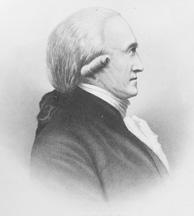
Nathaniel and Benjamin later went to the "College of New Jersey" (now Princeton University) in Princeton. However, neither of them finished their degrees.
Serving in the American Revolution
Macon took part in the American Revolution for a short time. He returned to North Carolina in 1776 and studied law for three years. In 1780, he rejoined the fight as a private soldier. He was likely present at the Battle of Camden.
Marriage and Family Life
Nathaniel Macon met Hannah Plummer in Warrenton, North Carolina, in 1782. They were both from well-known families. Nathaniel was a tall and handsome man. After several months, Hannah and Nathaniel decided to marry.
There's a famous story about their courtship. Macon supposedly played a card game for Hannah's hand and lost. But he told her, "even though I lost you fairly—love is stronger than honesty—I cannot give you up." This won her heart, and they married soon after, on October 9, 1783. Their marriage was very loving.
His Children and Later Life
Nathaniel and Hannah Macon had three children:
- Betsy Kemp Macon (born 1784)
- Plummer Macon (born 1786)
- Seignora Macon (born 1787)
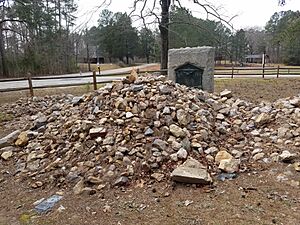
Sadly, Hannah died on July 11, 1790, when she was only 29. Nathaniel was 32 at the time. He never remarried, showing his deep devotion to her memory.
Their only son, Plummer, died just over a year after Hannah. They were both buried near their home. When Nathaniel died on July 29, 1837, at age 79, he was buried next to his wife and son. He asked for their graves to be covered with a large pile of flint stones. He believed this would keep the land from being farmed, protecting their burial site forever.
Buck Spring Plantation
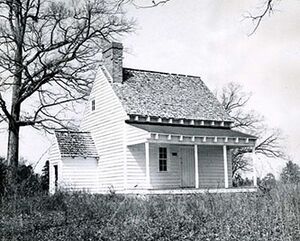
Macon and his wife lived on their plantation called "Buck Spring Plantation" in North Carolina. It was about 12 miles (19 km) north of Warrenton. His father had left him land there. Over time, his plantation grew to 1,945 acres. About 70 enslaved people worked on his land. Macon often worked alongside them in the fields.
He also served as a justice of the peace and a trustee for the Warrenton Academy. He raised race horses and had fox hounds. In 1819, he even hosted President James Monroe for a fox hunt.
Nathaniel Macon's Political Career
Macon served in the North Carolina Senate for Warren County in 1781, 1782, and 1784.
He was known for opposing a strong central government. For nearly 40 years in Congress, he was often called a "negative radical" because he voted "no" so often. He believed in saving public money and was very strict about government spending.
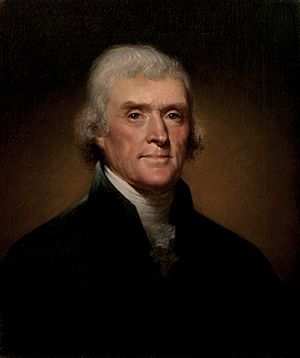
He supported the foreign policies of Presidents Thomas Jefferson and James Madison from 1801 to 1817. Macon strongly disliked Alexander Hamilton and his Federalist ideas.
Early Years in Congress (1791-1799)
Macon was especially against having a navy, fearing it would cost too much money. He strongly opposed the Jay Treaty in 1795, which was an agreement with Great Britain. He also spoke out against the Alien and Sedition Acts of 1798 and the idea of going to war with France in 1798–99. Macon supported the Kentucky and Virginia Resolutions, which argued for states' rights.
Speaker of the House (1801-1807)
Macon became the Speaker of the House in 1801, serving until 1807. He was the fifth person and the first Southerner to hold this important position. He supported the Louisiana Purchase in 1803, which greatly expanded the United States. He even tried to convince Jefferson to buy Florida too. Jefferson offered Macon the job of postmaster general twice, but Macon turned it down.
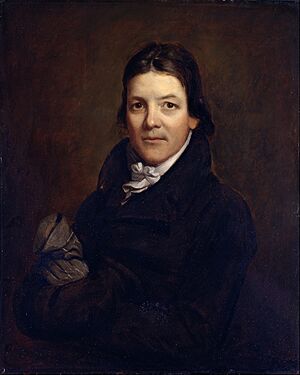
During his second term as Speaker, Macon started to disagree with President Jefferson. He felt that Jefferson was moving away from the idea of a limited government and strong states' rights. He began working more with John Randolph and John Taylor. This group was called the Quids, a smaller part of the Democratic-Republican Party. Even with these disagreements, he still won a third term as Speaker.
He decided not to run for a fourth term as Speaker in 1807. Instead, he became the head of the Foreign Relations Committee.
Later Years in Congress (1810-1828)
Macon supported President Madison's decision to declare the War of 1812. However, he was against forcing people to join the army and against raising taxes to pay for the war.
He did support some federal government funding for road construction. But generally, he opposed "internal improvements" (government projects like roads and canals) that were promoted by politicians like Henry Clay and John C. Calhoun. He voted against bringing back the United States Bank in 1811 and 1816. He also consistently voted against any kind of protective tariff (taxes on imported goods to protect local businesses).
Macon was a strong supporter of slavery. In the 1820 debate about Missouri becoming a state, he voted against the Missouri Compromise. This compromise tried to balance the number of free and slave states.
After His Retirement
After leaving public office, Nathaniel Macon continued to be involved in public life. In 1832, he wrote a letter to President Jackson. He protested Jackson's idea of using military force to stop the "nullifiers" in South Carolina during the Nullification Crisis. Macon believed that states had the right to leave the country if they chose.
He also served as the President of the 1835 convention that changed the Constitution of North Carolina. Most of these changes were about making the state government more democratic. Macon was mostly against the changes that were adopted. He also served as a trustee for the University of North Carolina at Chapel Hill. He supported Martin Van Buren in the 1836 presidential election.
Places Named After Nathaniel Macon
Many places are named after Nathaniel Macon, honoring his long career in public service:
- Macon County, Alabama
- Macon County, Illinois
- Macon County, Missouri
- Macon, Missouri
- Macon County, North Carolina
- Macon, Georgia
- Macon, Illinois
- Macon, Mississippi
- Macon County, Georgia
- Macon, North Carolina
- Macon County, Tennessee
- Randolph-Macon College
- Fort Macon
Images for kids
See also
 In Spanish: Nathaniel Macon para niños
In Spanish: Nathaniel Macon para niños
 | Frances Mary Albrier |
 | Whitney Young |
 | Muhammad Ali |

